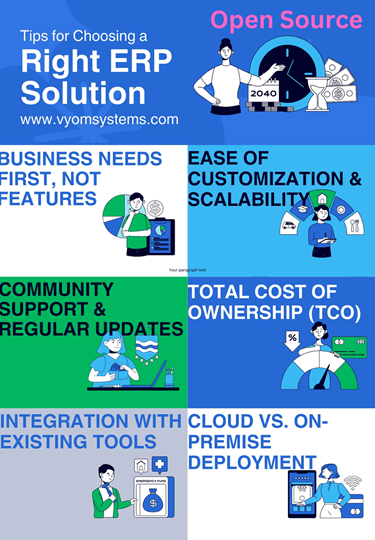Tips for Choosing the Right Open-Source ERP for Your SME
Selecting the right ERP (Enterprise Resource Planning) system is a game-changer for SMEs. Open-source ERP solutions offer flexibility, cost savings, and customization—but choosing the wrong one can lead to hidden costs, complexity, and inefficiencies.
2/23/20251 min read


Here’s how to make the right choice for your SME:
✅ Key Factors to Consider
1️⃣ Business Needs First, Not Features
Identify core processes: Accounting, HR, Inventory, Sales, CRM, Field Service
Avoid bloated solutions with unnecessary features
2️⃣ Ease of Customization & Scalability
Choose an ERP that grows with your business
Ensure easy module customization without deep coding knowledge
3️⃣ Community Support & Regular Updates
Check if the ERP has an active developer community
Frequent updates mean better security & features
4️⃣ Integration with Existing Tools
Ensure compatibility with HR software, CRM, and eCommerce platforms
Open APIs & third-party integrations save effort in the long run
5️⃣ Cloud vs. On-Premise Deployment
Cloud-based → Less maintenance, faster setup, better accessibility
On-Premise → More control, higher security for sensitive data
6️⃣ Total Cost of Ownership (TCO)
Free ERPs still require implementation, training & maintenance costs
Consider long-term ROI, not just the initial price
🚀 Final Takeaway
Choosing the right open-source ERP depends on your business size, industry, and growth plans.
✅ For modular, scalable growth → Odoo
✅ For easy-to-use, startup-friendly ERP → ERPNext
✅ For freelancers & small teams → Dolibarr
✅ For manufacturing & inventory-heavy businesses → Metasfresh
Vyom Systems Pte Ltd.
Innovative technology for your business growth.
sales/support
info@vyomsystems.com
+65-8363 4041
© 2025. All rights reserved.
